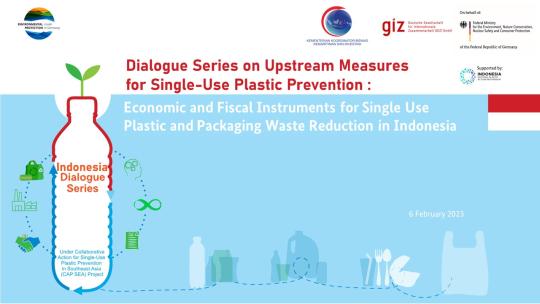Economic and Fiscal Instruments for SUP and Packaging Prevention in Indonesia
Europe/Berlin: 8:00 - 10:00am

Background
The increased awareness of externalities of Single Use Plastic (SUP) products in the transition towards circular economy has led to the implementation of numerous waste prevention policies globally. The policies include economic and fiscal measures that apply in different contexts with varied focus but essentially to trigger the establishment of sustainable packaging economy. While most existing policies focus on waste management, upstream policies targeting reduction of SUP production and consumption are still in the initial stage. Measures focusing on waste management should not be implemented alone without being complemented by upstream as the effectiveness to reduce the waste volume is limited and will increase the financial burden of public budget significantly. To this end, coherent upstream and downstream policies need to be established in parallel to achieve the highest impact.
The ubiquitous use of SUP in the current economy requires introduction of policies in various stages of plastic lifecycle, including upstream stage. The success of these policies is questioned by limited data to capture plastic problems in targeted context, disintegrated downstream and upstream policies, and constraints in financing, capacity and governance to implement existing and new policies.
Additionally, as the upstream policies affect fewer actors which increase the likelihood of resistance to these measures. A better understanding of these various measures will strengthen decision makers to choose policy suitable to be implemented in Indonesia. This fifth episode will discuss the existing fiscal and economic measures implemented globally as upstream policies for SUP reduction and introduce measures that can be implemented in Indonesian context.
The dialogue series is part of GIZ’s module “Collaborative Actions for Single Use Plastic Prevention in Southeast Asia (CAP SEA)” supported by the Coordinating Ministry of Maritime Affairs and Investment and NPAP Secretariat. The CAP SEA module is part of GIZ’s global project to support the BMUV’s “Export Initiative Environmental Protection.”
Aim of the event
To share conceptual framework of fiscal and economic measures available globally and to provide knowledge for measures feasible to be implemented in Indonesia to strengthen SUP reduction effort in Indonesia.
Learning outcomes
- To share existing economic and fiscal measures applied globally to combat SUP proliferation
- To introduce prioritized economic and fiscal measures feasible to be implemented in Indonesia
- To learn more about opportunities and challenges for implementation of economic and fiscal measures in Indonesia
Agenda
|
Jakarta Time |
Duration in minutes |
Activity |
Speaker |
|
Opening |
|||
|
14.00 – 14.05 |
5‘ |
Greeting and Welcome |
Host GIZ |
|
14.05 – 14.10 |
5‘ |
Keynote Speech
|
The Coordinating Ministry of Marine and Investment Affairs, Republic Indonesia (tbc) |
|
14.10 – 14.15 |
5’ |
About CAP SEA and Dialogue Series |
CAP SEA Project Manager |
|
Capacity Building |
|||
|
14.15 – 14.25
|
10‘ |
Fiscal and Economic Measures in Europe and other regions |
Clara Loew and Siddhart Prakash Senior Researcher Oeko Institute |
|
14.25 – 14.45 |
20’ |
Potential Economic and Fiscal measures for SUP reduction in Indonesia |
Mr. Gan Gan Dirgantara Consultant |
|
14.45– 15.05 |
20’ |
Q & A Discussion |
Facilitator GIZ |
|
15.05 – 15.20 |
15’ |
Challenges and Opportunities to Implement Fiscal and Economic Measures for SUP reduction in Indonesia |
Head of Centre of Financing Policies for Climate Change and Multilateral, Fiscal Policy Agency, Ministry of Finance |
|
15.20-15.55 |
35' |
Q & A Discussion |
Host GIZ |
|
15.55 – 16.00 |
5‘ |
Wrap up and closing |
Host GIZ |
The dialogue series is conducted mainly in Bahasa Indonesia with simultaneous translation into English.